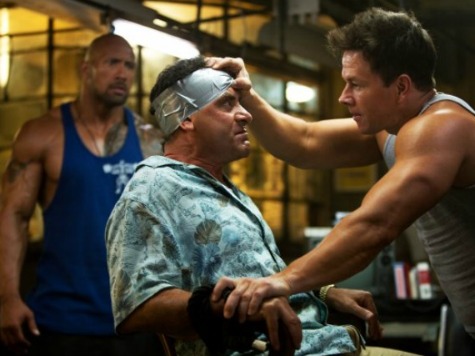
Pain and Gain is an oddly disconcerting film. At the same time that it mocks the dimness of its leads (and admittedly, they are quite dumb), it also unabashedly embraces the violence and relentless energy of a typical Michael Bay blockbuster.
By the time the story ends, audiences could be left wondering if they just witnessed a train-wreck or a satisfying comedy. My feelings are mixed, but I can’t help but wonder if this story could’ve–in the right hands–been the subject of a truly great film.
The story begins in 1994 when a bodybuilding trainer named Daniel (Mark Wahlberg) is looking to improve his life. He recently helped turn around the fortunes of a local gym–tripling its clientele in a matter of months– but doesn’t want to spend the rest of his life in sweatpants. His goal then is to find a wealthy client and steal all of his possessions. His target: an obnoxious businessman named Victor (Tony Shalhoub).
As Daniel begins training Victor at the gym, we learn from a voice-over about the gym rat’s can-do attitude. “We all start out equal,” Daniel says, but few people grasp their full potential. Others waste their lives. Daniel believes that the United States was scrawny once, too (13 puny colonies). But then it got big and strong and now it’s the buffest country in the world. The story takes much of its comedy from such thoughts, basking in the simplicity of its characters’ ideas.
In his plan to kidnap Victor, Daniel enlists the help of another bodybuilder named Adrian (Anthony Mackie) and a religious ex-con named Paul (Dwayne Johnson). Johnson, better known as “The Rock,” is a simplistic man who believes in the Bible but doesn’t understand its core values. A former alcoholic, he is easily persuaded to do some of the monstrous things that Daniel doesn’t want to do himself.
Much of this comedy is built around how inane the three main characters are and how they can’t seem to do anything right. A would-be kidnapping of Victor becomes farcical, leading to more and more chaos. Like the characters in Burn After Reading (2008), these gym rats believe that they have a perfect plan to get ahead but don’t have the brains to pull it off.
The story succeeds in many ways as a comedy, offering up laughs because the trio pulling off the heist are so dumb that the success they do have is quite shocking. And in fact, such people did exist and were successful– a fact that the director reminds us of several times in the picture. This is based on a hard-to-believe true story that begged for a big-screen adaptation.
The story’s biggest issue, though, is that Bay never lets the true story have its moment in the sun. He is too busy creating caricatures of these criminals to let characters shine through. He over-produces everything, throwing too much at the screen to make any of it seem real. It’s no wonder that several of the real victims have come out against the film. It makes the hell they lived through feel like a cartoonish fantasy.
One can understand Bay’s ambitious goal: take a true story, exaggerate its characters and then pop it on the big screen in his typical unsubtle manner. But what’s disconcerting is the mishmash that he has created. Full of graphic torture sequences and then stinging comedy, the film never really completely works as a motion picture. It’s an odd combination that could please some but will likely leave most viewers feeling out in the cold.

COMMENTS
Please let us know if you're having issues with commenting.